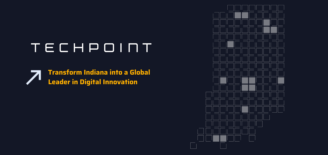Indiana a ‘surprising place’ driving tech jobs with second-highest tech worker percentage growth
After a two-year hiatus because of the COVID-19 Pandemic, the annual Technology Councils of North America Conference in Washington D.C.— more commonly known as the “TECNA Fly-in” – returned to the capitol. TechPoint President and CEO Ting Gootee and I (Jordan Isaacs) participated in the event, which allowed us to connect with peer organizations and businesses, and engage with experts from across the United States and Canada who are focused on the intersection of tech and public policy. Among the trending tech topics discussed included the hot tech-labor market, the migration of tech workers, and the final negotiations of both the America COMPETES Act in the House and United States Innovation and Competition Act (USICA) in the Senate.
Traditional tech hubs continue to drive jobs
It’s no secret that the last two years have produced one of the largest migrations of tech workers ever in the United States, and that was the key topic discussed. TECNA recently conducted a study in partnership with eImpact that focused on peeling back the tech workforce trends that have impacted the United States. The recently released study was presented by eImpact’s Erik Larson at the event and shed light on the migration of the movement. To read the entire study, check it out here.
The report highlights that traditional tech hubs continue to drive jobs, but hundreds of thousands of tech roles are being created in what TECNA calls “surprising places.” The study is broken down into several categories. In terms of the highest tech worker percent growth by state, Indiana comes in at the second spot with 8.4% growth. The Hoosier State was slightly edged out by Maryland which saw an 8.42% percent increase. Additionally, the report looked at regions making the most progress on closing the tech talent gender gap with Georgia, Maryland, and North Carolina leading the way among the 25 states with the highest growth rates of tech worker profiles.
Dennis Trinkle, TechPoint’s EVP of talent pathways recently commented on this story to Inside Indiana Business and welcomes the news about the highest tech worker percentage growth by state, but indicates that more work must be done to help Indiana meet the global tech talent challenge.
Sharing challenges and successes with Indiana senators
Ting and I also met to meet with Indiana’s two United States Senators while in Washington. Ting had the opportunity to introduce herself to both Senator Young and Senator Braun and share some of TechPoint’s work in regards to tech talent development as well as venture capital investment in the state. She provided an overview of Indiana’s tech ecosystem and some of the challenges that the tech ecosystem is currently facing.
The visits come at a critical time for technology industry-related legislation in Congress. On the day of our visit to the Hill, the first conference committee hearings were held for the Bipartisian Innovation Act (BIA), which is the marrying of the Senate passed USICA and House passed America COMPETES Act.
After several months of both chambers painstakingly negotiating and passing individual bills focused on innovation, the Senate and House of Representatives will come together to hammer out the details of the final legislation. Indiana’s Senator Young played a leading role in the development of this bi-partisan legislation in partnership with Majority Leader Chuck Schumer, which includes important components that govern the expansion of domestic semiconductor production.
The ultimate goal is to ensure the United States remains internationally competitive and dominant in the areas of technology, innovation, and STEM. While there are still a lot of moving parts with the BIA, experts expect negotiations to continue to move forward because of the critical nature of this legislation.
Forever changed expectations and norms around remote work
The past two years have presented several challenges and opportunities to businesses’ tech ecosystems throughout the United States. The pandemic has forever changed the movement of tech workers and the expectations and norms around remote work. Through TECNA and our work here at home, TechPoint will continue to stay abreast of the issues and work to help the Indiana tech sector rise up to overcome challenges and continue to thrive. Reach out if you have any questions about our work on the national stage.




